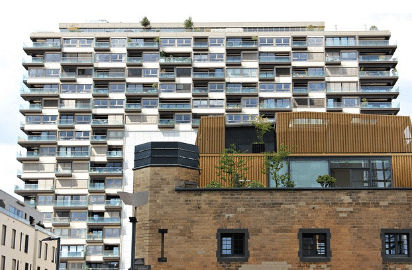“Mayors in cities across the U.S. want to loosen rules that can slow the pace of office-to-residential conversions”
In the past several years, urban landscapes have been undergoing a transformation as the demand for housing grows exponentially. As cities become more crowded, developers and urban planners are turning to innovative solutions to address the mounting housing crisis.
One particularly creative solution gaining traction is the repurposing of commercial office spaces into residential units.
With advancements in remote work and flexible work arrangements, the need for traditional office spaces has diminished, leading to an abundance of vacant or underutilized commercial properties. Repurposing these spaces into residential units creates a unique opportunity for many investors and landlords, while revitalizing urban areas.
There are, however, several challenges and ripple effects from this method. And not every building is suitable for repurposing. But there are a few key effects coming out of this strategy:
- Shift in Market Demand and Property Values: As more commercial office spaces are converted into residential units, there is a notable shift in market demand.
- Repositioning and Investment Opportunities: Developers and investors can identify undervalued or underutilized commercial properties and explore their potential for residential conversion.
- Impact on Surrounding Markets: Repurposing these spaces can revitalize neglected or declining neighborhoods, fostering a renewed sense of community and economic growth. This will also boost the value of other asset classes in the surrounding community
For more stories on ways the CRE landscape takes a look at a recent One Observation article that touches on the green revolution that is reshaping Commercial Real Estate construction. Is Commercial Real Estate Going Green?
Charlie Coppola
[email protected]
East Coast mayors call for more office-to-apartment conversions
- Many public officials would like to make it easier for developers to convert underutilized office buildings into residential apartments.
- Development costs, particularly those related to build standards and zoning codes, make many conversions challenging to finance.
- Nearly 50,000 housing units have come from conversions since 2000, according to CBRE – a modest sum when compared with other forms of development.
“We have a great opportunity to change the uses in the downtown,” said Washington, DC, Mayor Muriel Bowser at a December 2022 news conference in support of her housing budget proposals.
“It’s absolutely a budget gimmick” said Erica Williams, executive director at the DC Fiscal Policy Institute, referring to Bowser’s 2023 proposal to increase the downtown developer tax break. “We fully support the idea that some of these buildings could be turned into residential properties or into mixed-use properties, but that we don’t necessarily need to subsidize that.”
In New York City, a task force of planners assembled by Mayor Eric Adams is studying the effects of zoning changes, and possible abatements for developers who include affordable units in conversions.
Cities like Philadelphia have previously embraced these policies to revitalize their downtowns. In Philadelphia, homeowners and investors received more than $1 billion in tax breaks for their renovation projects.
A small collective of developers have taken on this challenging slice of the real estate business. Since 2000, 498 buildings have been converted in the U.S., creating 49,390 new housing units through the final quarter of 2022, according to real estate services firm CBRE.
Prominent investors Societe Generale and KKR have worked with developers like Philadelphia-based Post Brothers to finance institutional-scale office conversions in expensive central business districts.
“Capital has gotten much more limited,” said Michael Pestronk, CEO of Post Brothers. “We’re able to get financing today. … It is a lot more expensive than it was a year ago.”
Many experts believe local governments will alter zoning laws and building codes to make these conversions easier over the years.
“Our rules are in the way, and we need to fix that,” said Dan Garodnick, director of New York City’s Department of City Planning.
https://www.cnbc.com/2023/07/15/east-coast-mayors-call-for-more-office-to-apartment-conversions.html









